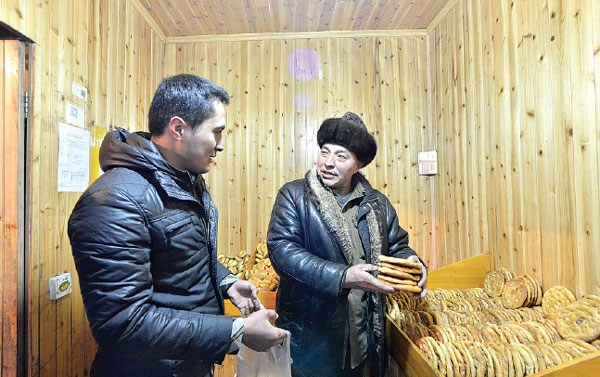Reunion repays debt of gratitude
|
Turgonjan Maola (right) now works as an assistant at his son's nan shop in Xinjiang. His son, Dalixat, continues the family's nan business, and he helps his father to track down the two landlords in Suzhou and Shanghai. Shan Kun / for China Daily |
Nan maker meets with landlords from past who helped during hard times
Turgonjan Maola returned to his life as an assistant at his son's shop after he fulfilled a 16-year dream - a reunion with two kind landlords - in late January.
The 56-year-old Uygur had always thought a lot about the two people who rented a house to him and helped him when he started his business as a maker of nan, oven-baked flatbread, in Shanghai and Suzhou in the 1980s and 1990s. He had failed to maintain contact with them because he lost their addresses and phone numbers after he returned to Urumqi, capital of the Xinjiang Uygur autonomous region.
"I even didn't know the correct characters of their names, but I never forgot what they did for me," Turgonjan said after a six-day trip to meet the two men who had been so helpful in the past.
In the early 1980s, Turgonjan went to Shanghai to make his living. With insufficient money, and lacking familiarity with Mandarin, he found it difficult to survive and was forced to return home.
In 1984, he married Patigul Yusup in Kashgar and went to Suzhou with her in 1985. The couple rented a house from Wang Jinda.
"Wang was very helpful," said Turgonjan.
In 1989, his wife became pregnant, and the couple went back to their hometown.
"When Dilixat, my eldest son, was 4 years old in 1994, I decided to go to Shanghai to make a better life for him," Turgonjan said.
The family found themselves struggling again, with little cash and no relatives or friends, until Yang Meidi came to their assistance. Yang not only offered them a roof over their heads but also helped them set up a nan stall. He bought wheat flour for them, and once the nan pit was fired up, the family began to feel settled.
"My father would probably have lived like a vagrant, sleeping in the park without help," said Dilixat. "Grandpa Yang also dealt with the procedures involved in my schooling, so I called him Shanghai grandpa."
In 1997, the family moved to Suzhou again and lived in Wang's house.
"He emptied a room for us to become the nan shop and bought flour to help the business get started," Turgonjan said.
Wang was also treated like a family member.
"He treated me like his daughter and my son called him grandpa," Patigul said.
The family's life has improved much since those days. Turgonjan managed to accumulate enough savings to be able to return to Xinjiang in 1999 and settle down in Urumqi to run a shop selling dried fruits and nuts.
Dilixat, 25, knew his father wished to find Wang and Yang, so he sought help from the media at a time when it was collecting stories about Xinjiangers in other provinces.
With the help of the media, Turgonjan managed to find Wang and Yang, and flew to meet them.
"The reunion meant so much to me," said Turgonjan. "I could hardly pay back their kindness, but paying them a personal visit made me feel better."
Dilixat has continued the family's nan business. He runs a shop and also an online store.
"My grandpa made nan in the county and my father brought nan to Suzhou and Shanghai," Dilixat said. "I can sell it all over the country through the Internet."
Turgonjan closed his shop years ago but helps with packaging at his son's business.
"I am living a happy and affluent life now, but I will never forget the ones who helped me," he said.
gaobo@chinadaily.com.cn



















